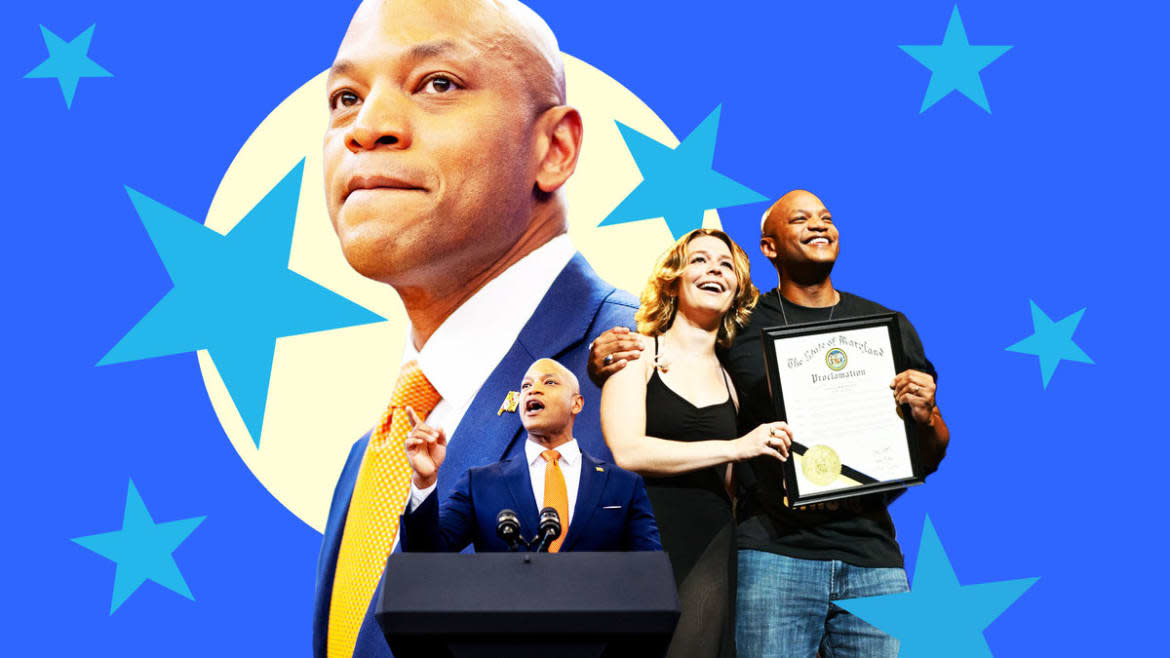Clemencies, Concerts and Oprah’s Cash: Is Wes Moore the Next Obama?

Less than an hour into Maggie Rogers’ sold-out show Sunday in Maryland, the Grammy-nominated singer-songwriter brought out a surprising special guest onstage: Gov. Wes Moore.
The Democrat, dressed in blue jeans and a black t-shirt with the slogan “Maryland Tough, Baltimore Strong,” was greeted with an ear-shattering round of applause from the 20,000 concertgoers—an acclamation that only grew when Moore proclaimed June 16 as “Maggie Rogers Day” in the state.
Hours later, Moore made another—starkly different—announcement when he signed an executive order pardoning more than 175,000 marijuana-related convictions in one of the largest-ever acts of clemency involving low-level drug offenses.
“We’re taking actions that are intentional that are sweeping and unapologetic,” Moore said at a Monday morning press conference. “But there’s a reason that we’re being so intentional today. Policymaking is powerful.”
For most first-term governors, the dual headline-making moments seem like an impressive political feat. But for Moore, an Army veteran who once led the largest anti-poverty non-profit in the country, it is the latest in a series of bold moves that have pushed him into the national—and even presidential—conversation.
Maryland Guv Dismisses GOP’s ‘DEI’ Attacks as ‘Foolishness’
Kaye Wise Whitehead, a professor of communication and African American studies at Loyola University Maryland, told The Daily Beast that Moore has three qualities she believes exist in some of America’s most popular presidents: charisma, likability, and reliability.
“It’s something we have not seen since Barack Obama,” she said. “Whether you liked Clinton or not, his likability rating was high—people wanted to have a beer with him.”
Moore, 45, made history last year as Maryland’s first Black governor—and only the third in the country. Before he turned to politics, the father-of-two was a college football player, a Rhodes Scholar, an Army captain deployed to Afghanistan, an investment banker, a bestselling author, and the CEO of the nonprofit Robin Hood.
Dr. Basil Smikle, a political strategist and director of the Public Policy Program at the Roosevelt House Public Policy Institute of Hunter College, said Moore’s role at Robin Hood allowed him crucial access to some of the biggest donors and policy advocates that could benefit his political career.
“The benefit to him is that he became conversant with policy issues and knows how government, nonprofit, and private sectors should respond to local needs,” Smikle, who is also a former New York State Democratic Party executive director, said.
While he lacked prior political experience, he joined the 2022 race with an impressive resume—and even more impressive friends—to surpass some of the biggest names in local politics, including a former state attorney general. He received an endorsement from former President Barack Obama, as well as countless other big-name nationally recognized Democrats.
David Karol, an associate politics professor at the University of Maryland, described him to The Daily Beast as a “protege of Oprah,” who helped him campaign and raise money and spoke at his inauguration after he won almost 65 percent of the vote.
The media attention, however, has also been used as ammunition by his political rivals. Republican state Rep. Dan Cox, who unsuccessfully ran against Moore, called him out and demanded his memoir be pulled from classrooms because of an error in the dust jacket.
“I think Mr. Moore needs to come clean and the book needs to be withdrawn from the curriculum,” Cox said in September 2022.
While there was speculation before he assumed office about whether Moore may eventually push for a presidential bid, labels like “rising star” have only grown after the Francis Scott Key Bridge partially collapsed in March. After a container ship struck one of the bridge’s piers, Moore seemed ever-present at the disaster site, frequently wearing jeans and jerseys.
“I think this latest news cycle also speaks to how well he's able to adjust one thing to the other,” Whitehead said. “It’s very difficult to pigeonhole him because he is interested in what's happening locally… but he's also showing up in such a way that he is attentive to the national culture.”
The tragedy also made Moore susceptible to partisan backlash. In several interviews, Moore dismissed a right-wing talking point that “DEI” officials like the governor and Baltimore Mayor Brandon Scott were to blame for the collapse.
Republican Utah state Rep. Phil Lyman insisted “this is what happens when you have Governors who prioritize diversity over the wellbeing and security of citizens”—though he later tried to walk back those comments.
Whitehead said Moore has a “refreshing” view of Maryland and strategically comments on issues to “make sure he stays on the right side of history.” After an illegal immigrant was recently accused of killing Maryland mother Rachel Morin last year, Moore has delicately waded between supporting her family and dipping his toe into the heated debate over immigration debate.
“We know that we have got to fix a broken immigration policy. And we know that we need Congress to act on this,” he said Sunday on CBS News’s Face the Nation, going much further than most Democrats on the issue.
While Moore has not made any public comments about whether he plans to run in 2028, Whitehead speculated he’ll be an even bigger Democratic darling given his competition.
“There are very few charismatic potential leaders of the DNC right now, and many of those that are come with a lot of baggage right now. Governor Wes Moore is baggage-free at this moment,” she added.
Get the Daily Beast's biggest scoops and scandals delivered right to your inbox. Sign up now.
Stay informed and gain unlimited access to the Daily Beast's unmatched reporting. Subscribe now.

